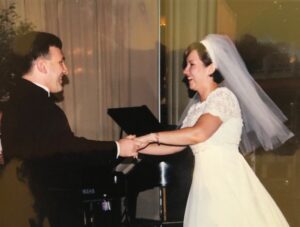Before we got married we took dance lessons. From a local Arthur Murray studio. Private lessons because, at that time, there was no way in hell Dan was going to learn to dance in a group setting. Cassie loved the lessons. Dan hated them. And he didn’t hide it. Often he would “escape” to the bathroom for a break and Cassie would end up apologizing to the instructor for Dan’s grumpiness. The instructor, who was really good-natured through all of this, suggested we learn the basic dances – foxtrot, swing, waltz – over eight or so lessons. However, at our first lesson, Dan declared he only needed to learn one dance. The one that would best fit the song we had chosen for our first dance as a married couple. One dance only. In Dan’s mind, there was no reason to learn other dances when the sole purpose of these lessons was to get us prepped for the one big dance.

We share this because recently, at a socially distant dinner with friends in our backyard, we were discussing how families change when a kid goes off to college. One person said that when her oldest left it was “like the rest of the family had to learn a new dance.” Before that, everyone knew their dance steps – their role in the family, But, when one family member was no longer home, they all had to adjust. Learn new steps, a new rhythm, a whole new dance.
Cancer has forced us to learn a new dance. The music has changed at our house. We’ve each been required to take on different roles and to approach our lives differently — individually and as a couple.
Dan has become a caregiver. Cassie has become (or is trying to become!) a “caregetter.” Cassie’s new moves include patience, asking for and accepting help (the accepting part is an exceedingly complex and difficult dance step). She has had to practice doing less and sharing more which, for an intensely private person, is like learning to dance without any music. Dan’s had to learn to notice and do more, read Cassie’s energy level and he too has had to practice asking for help and support from friends and family which for him is also not a natural move. New communications challenges have also emerged. Dan is learning (duh) that he can’t encourage Cassie to let him do more and then be resentful when she does. Cassie has had to work on not taking her anger at the cancer out on Dan. New moves abound.
So how do you learn new dances on the fly with no lessons? While we both have received valuable support in our new roles thanks to Firefly Sisterhood and Jack’s Caregiver Coalition, we are finding out that we mostly have to teach ourselves. Try on these new roles. Plan new activities and don’t abandon them right away if they feel a little awkward. Stumble through uncomfortable exchanges and conversations. As we navigate living with metastatic breast cancer, we are learning to dance all over again and this time it’s not just for one song — it’s for our entire lives.
